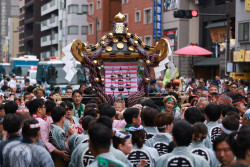
September 16, 2010
No Goal
The JFA missed an opportunity choosing Japan’s new football coach. And then some
By Metropolis
Originally published on metropolis.co.jp on September 2010

Illustration by Phil Couzens
Pity Alberto Zaccheroni. The Italian manager went through some rough patches during his time in the Serie A, but he might have expected a warmer reception than the collective sigh that greeted his appointment as Japan’s new national team coach last month.
Many people here were desperate for a big-name manager to replace the outgoing Takeshi Okada, while others were clamoring for somebody with experience in the J.League. In hiring Zaccheroni, the Japan Football Association (JFA) has fallen between two stools and ended up not really pleasing anybody.
While undoubtedly a highly skilled manager, Zaccheroni doesn’t tick the “big-name” box. He’s never worked outside of his homeland, nor does he bring any prior knowledge of Japanese football with him—save for a spell coaching Masashi Oguro during the FC Tokyo striker’s stint at Torino.
JFA technical director Hiromi Hara, who conducted the search, maintains that he got exactly the kind of coach he was after. “I talked to people in Europe and South America and was determined to find someone who could help Japanese soccer grow,” he declared. “I believe we found the right man for the job.” Fair enough, but there are several questions that need answering.
First, if indeed the former AC Milan coach was always in the frame, why did it take so long to get him on board? While the JFA officially gave themselves a couple of months to recruit the new man, they actually had much longer, as it was always clear that Okada would step down after the World Cup. With this in mind, surely they should have been putting feelers out ahead of the tournament in order to make the transition from one coach to the next as smooth as possible?
Second, if they were so convinced by Zaccheroni’s suitability for the post, why on earth did they allow the negotiations to drag out for so long? The protracted process meant that the Italian had to content himself with a place in the stands during Japan’s recent friendlies with Paraguay and Guatemala, as his visa hadn’t been cleared in time.
Finally, if the JFA is so confident that it has the right man to take Japan to the next level, why has Zaccheroni not been given a contract that reflects this trust? When asked about the details of the agreement, Hara’s response was far from convincing. “I can’t reveal the exact figures of the contract,” he said, “but we will assess the situation on a year-by-year basis. Of course, we hope he will be in charge for the next World Cup [in 2014].”
Among the heavyweight names that Hara reportedly failed to secure for the role are former Real Madrid coach Manuel Pellegrini and Dutch legend Marco van Basten, while Japan-based coaches were seemingly dismissed out of hand.
One of those snubbed was Kashima Antlers chief Oswaldo Oliveira. The Brazilian has guided his side to three consecutive J.League titles since arriving in the country, and threw his hat into the ring at the eleventh hour once it seemed the JFA might be wavering. But then, there was no way the association was going to concede that its efforts abroad had been fruitless, and hire a guy who had been just up the road all along.
Another local coach whose name was linked to the role was Akira Nishino. The Gamba Osaka boss has criticized the simplistic manner in which the JFA was acting, and suggested that homegrown coaches aren’t given the credit they deserve. “The level of Japanese coaches is rising, so it’s about time that they should be recognized,” he opined. “It seems like the association is always thinking we need a foreign coach. I feel that Japanese coaches are underestimated.”
The uninspiring conclusion to this whole saga demonstrates one of the problems that Japanese football—and, to an extent, Japanese culture—exhibits all too frequently. Rather than following its convictions and standing or falling by them, the JFA procrastinated and dithered, ignoring the people seemingly best qualified for the job while allowing the really big names to get away.
It would be foolish to write off a man with Zaccheroni’s experience before he has even taken charge of a match, but the clumsy way in which he has been ushered in means that he’ll have a lot of people to win over once he officially takes over for next month’s games with Argentina and South Korea.







